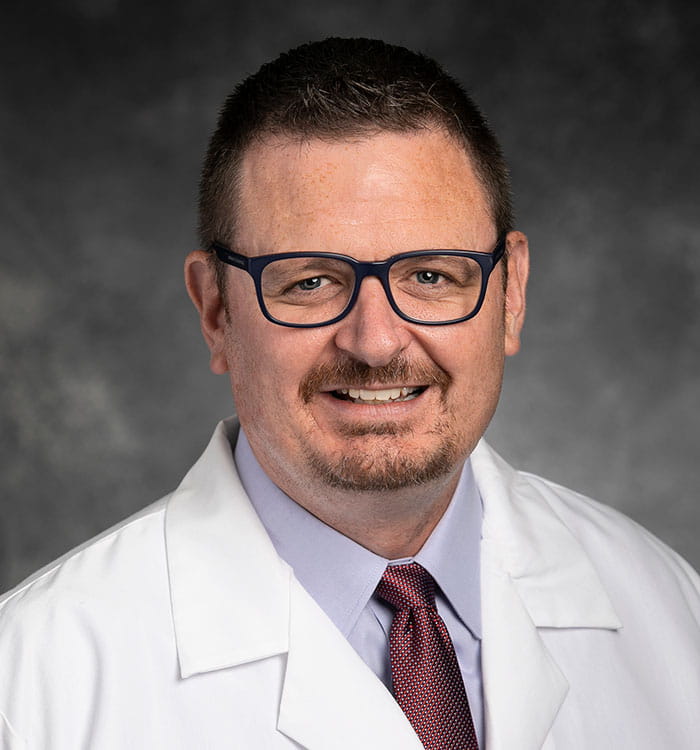Understanding Immune Response in Respiratory Illnesses
November 22, 2022
University Hospitals Cleveland Medical Center is American Lung Association Research Awardee
Innovations in Pulmonary & Sleep Medicine | Fall 2022
The COVID-19 pandemic has spurred a renewed effort to better understand the pathology of respiratory viruses and their acute and long-term consequences. To this end, the American Lung Association (ALA) developed the COVID-19 and Emerging Respiratory Viruses Research Award.
 Kenneth Remy, MD, MHSc, MSCI, FACCM
Kenneth Remy, MD, MHSc, MSCI, FACCMKenneth Remy, MD, MHSc, MSCI, FCCM, Director of Basic Science and Translational Critical Care Research in the Division of Pulmonary, Critical Care and Sleep Medicine at University Hospitals Cleveland Medical Center and UH Rainbow Babies & Children's Hospital, has just received one of these prestigious, two-year grants.
“Because my lab studies a number of different areas related to infection and immunologic defects in patients or host response, I submitted a proposal for this grant,” he says. “We'll be studying patients who are critically ill who have COVID-related acute lung injury or have any other virus that’s causing lung injury. We’ll follow them longitudinally both in and out of the hospital to better understand what exactly are the immune defects that contribute to poor outcomes.”
Dr. Remy and his team, Monty Mazer, MD, pediatric cardiac intensivist in University Hospitals Rainbow Babies & Children’s Hospital, and Rana Hejal, MD, Medical Director of the Medical Intensive Care Unit at University Hospitals Cleveland Medical Center, received this support from the American Lung Association because of evidence of their ongoing excellence and productivity in the fields of immune phenotyping and surveillance. Dr. Remy’s previous work was among the first in the world to demonstrate early in the pandemic the immunosuppressive effects of the SARs-CoV-2 virus.
Immune Response in Respiratory Viruses
Dr. Remy says researchers are learning more about how the presence of innate and adaptive immune system characteristics may suppress the immune system and decrease some patients’ ability to eliminate infection in severe acute respiratory syndrome coronavirus 2 (SARS-CoV-2) and other viruses. Through this research, he’ll compare the amount of virus in the lungs with the functioning of the immune system over time while patients are in the ICU.
Current therapeutic approaches to treating COVID-19 include reducing the hyperinflammatory response and eradicating viruses with antiviral medications. The goal of this research project is to understand the mechanisms of immune suppression and to determine the extent of virus in the lower respiratory tract in order to develop more effective therapies and mitigate long-term consequences.
“There are relationships and similarities of SARS-CoV-2 compared with other coronaviruses, such as influenza and Respiratory Syncytial Virus (RSV),” says Dr. Remy. “However, no one has taken a deep dive and followed specifically what exactly occurs in the lungs and blood samples over time against the predominant immune defects that lead to severity of illness. We’ve been able to develop some of these strategies with COVID-19. Long-term COVID is now a consideration for people with illness-related, long-term side effects. Even though COVID-19 numbers are down, we haven’t explored the potential that other viruses may, in fact, also have long-term consequences. This research will afford us that potential.”
Dr. Remy will begin enrolling patients from the ICU at University Hospitals who have COVID-19 or other viruses, with the goal of 100 or more patients in the study. Dr. Remy is also developing a study arm of people who’ve had viruses and who may have secondary sequelae.
“If you see patients in your clinic who have some untoward consequences from a recent viral illness, we may be able to enroll them in a non-intubated arm at some point,” he says.
University Hospitals at Forefront of Critical Research
“This was a very competitive application cycle,” Dr. Remy says. “The American Lung Association only took three applications out of a couple hundred submissions. We were fortunate to be selected.”
For more information about the COVID-19 and Emerging Respiratory Viruses Research Award, call Dr. Remy at 216-910-4016 or Kenneth.Remy@UHhospitals.org.
Contributing Expert:
Kenneth Remy, MD, MHSc, MSCI, FCCM
Director, Basic Science and Translational Critical Care Research
Division of Pulmonary, Critical Care & Sleep Medicine
University Hospitals Cleveland Medical Center
Co-Director, Clinical, Basic Science, and Translational Critical Care Research
Division of Pediatric Critical Care Medicine
UH Rainbow Babies & Children’s Hospital
Associate Professor
Case Western Reserve University School of Medicine


